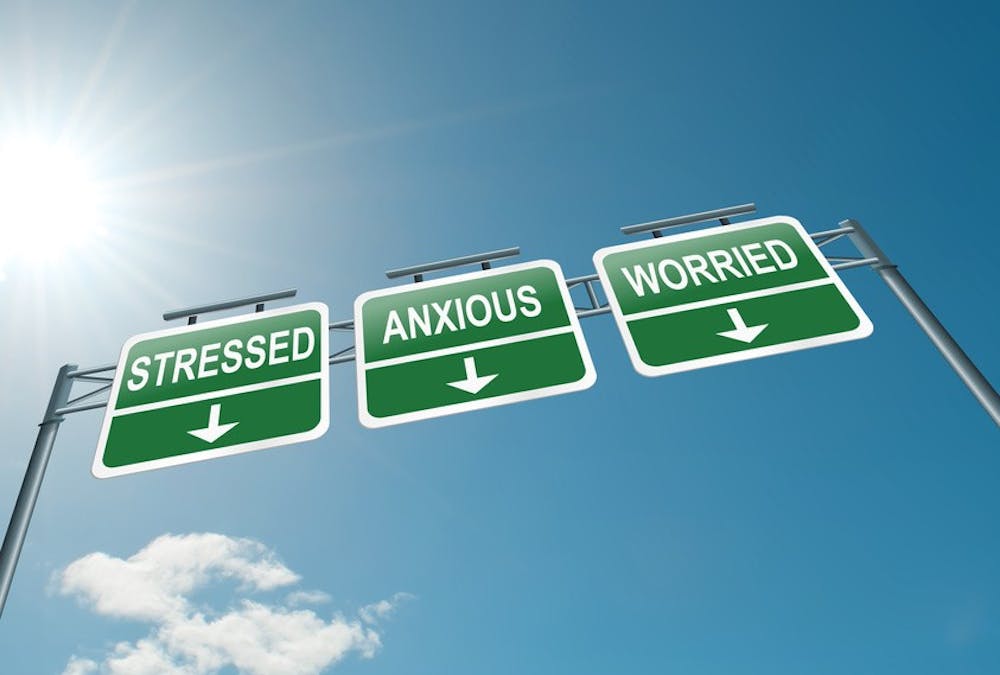by Jacob Fuhrer |
Obsessive worry. Racing thoughts. Loss of control. We all have these feelings at times, but when they become the routine instead of the exception, it could be a sign that anxiety has taken hold of your life and isn’t letting go.
A study released this year shows that college students are more at risk than ever when it comes to anxious feelings. The study, conducted by the Center for Collegiate Health at Penn State University, found that the number one concern for college students is no longer depression. Instead, over half of the college students surveyed after having approached counseling services had problems surrounding some form of anxiety.
It’s an issue that Kathryn Murdock, a sophomore political science major, knows all too well. In high school, Murdock collectively missed nearly a month of her senior year in part because of her anxiety.
“My anxiety is...that feeling in my stomach that you get when you’re scared or nervous, but it’s there all the time,” Murdock said.
Murdock avoided school after being sick, constantly afraid of disappointing teachers or friends. The more time she missed, the more anxious she felt about returning.
Around school, she began to have a reputation for being flaky because of all the time she missed.
“I hated not being able to be reliable,” Murdock said.
Despite this perception, Murdock did very well in high school, graduating as class valedictorian with a 4.4 GPA. Murdock is now doing much better after getting counseling from the Health Center as well as starting prescription medication.
Sascha Coursen, a junior theatre major, faces similar anxiety problems and was diagnosed with an anxiety disorder at 15.
While Coursen has found ways to manage the anxious feelings, she also sees the issue in a number of her friends.
“I’ve had multiple people this semester that I’ve held because they just cried,” Coursen said. “Another friend of mine has panic attacks and has really, really bad anxiety.”
At UP, Murdock and Coursen joined Active Minds, a group on campus that focuses on mental health.
Active Minds Co-President Jesse Dunn estimates anxiety is the biggest problem facing the group of nearly 200. Dunn attributes some of that anxiety to the competitive landscape of academia.
“There’s so much pride in having a lot on your schedule,” Dunn said. “I think that lends itself to higher stress levels.”
The theory echoes ideas from Will Meek, assistant director of counseling and training at the Health Center. While Meek says anxiety is more likely a confluence of different things in a person’s life, the pressure to do well in college also factors in.
“I do think there’s a difference in the sort of hyper-pressure to succeed, get the grades, compete for the good college,” Meek said.
Meek said UP is also seeing an uptick in cases related to anxiety, consistent with the research, but was careful to add that there is no research-based consensus explaining the rise in college student anxiety.
Dunn himself has struggled with anxiety for several years and was diagnosed with generalized anxiety disorder.
For other students struggling with anxiety or other mental health issues, Dunn routinely refers them to the Health Center.
Meek explained that students experiencing any type of anxiety often have difficulty concentrating on school and may feel tense or worried about the future.
To help with these feelings, Meek recommends using the acronym MEDS, which includes mindfulness, exercise, diet and sleep, all important factors that can reduce anxiety levels when properly balanced.
In addition, talking with Health Center counselors can help students find ways to organize their lives and learn healthier ways to cope with uncertainties in their lives. Meek says the concerns students have are across the board, from issues related to school, relationships, family and the future.
However, for some students experiencing greater anxiety or perhaps anxiety disorders, getting more rest and a revised mindset may not be enough. For those cases, medications can be prescribed at the Health Center.
Coursen and Murdock both recently began taking medication and have reported improvements.
“Ever since I started on Prozac my life has just kind of fallen into line,” Murdock said. “I feel much more capable and my mood swings have leveled out a lot.”
Meek says only a small number of students he sees take medication, but prescriptions are available.
“If you’re concerned about your mental well being, or maybe you’re approaching your threshold of where it’s interfering with your everyday life…go to the Health Center,” Murdock said. “I have a lot of faith in them. They’ve helped me a lot.” Jacob Fuhrer is a reporter for The Beacon. He can be reached at fuhrer17@up.edu or on Twitter @jacobfuhrer.








